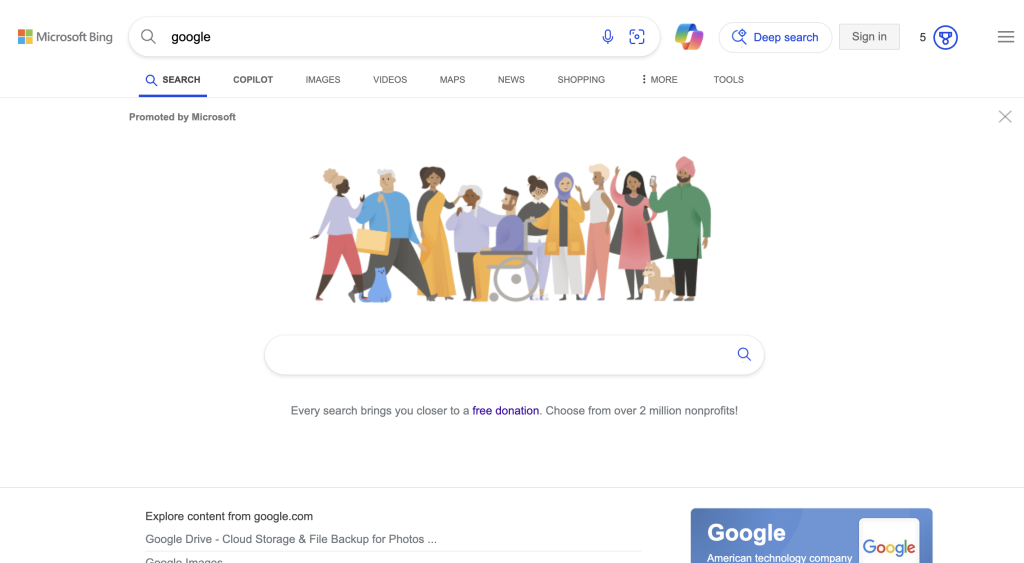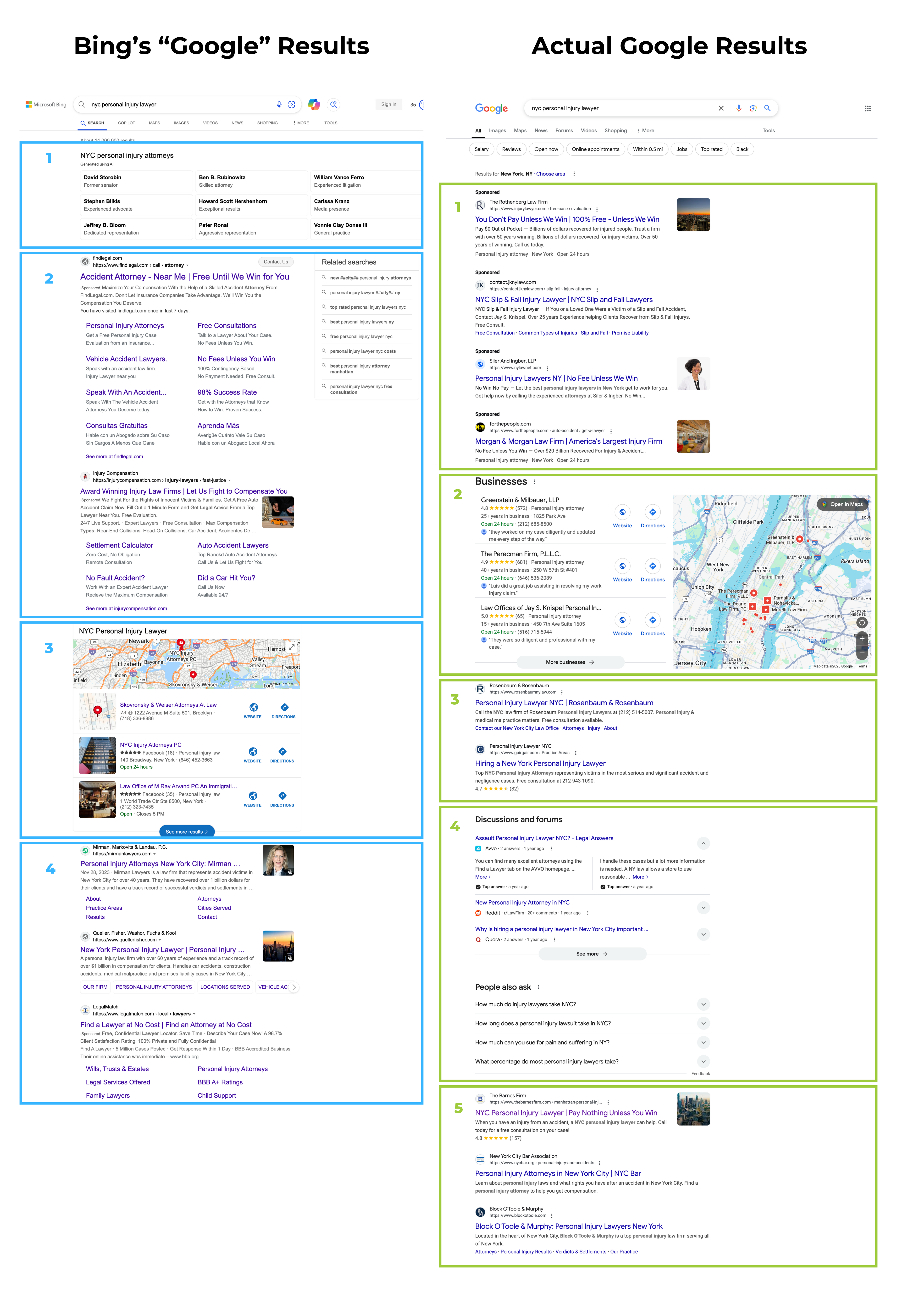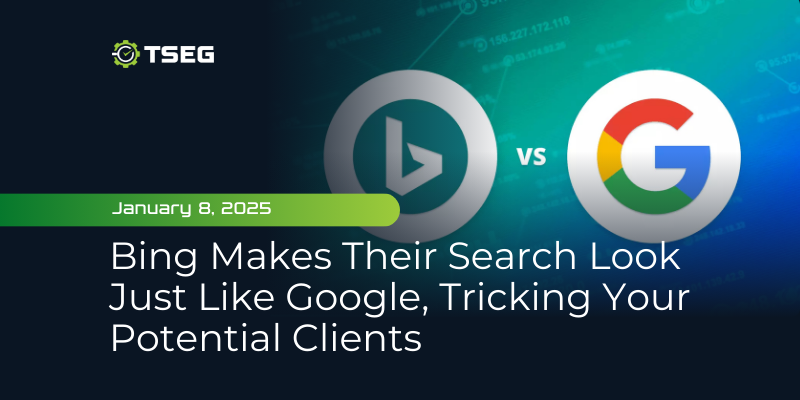Bing Makes Their Search Look Just Like Google, Tricking Your Potential Clients
Posted on Wednesday, January 8th, 2025 at 9:48 pm
A Subtle Yet Bold Move from Bing
Microsoft Bing has taken a daring step in its competition with Google, deploying a tactic that’s as clever as it is unconventional. When users type “Google.com” or just “Google” into Bing’s search bar, they’re greeted with a results page that mimics Google’s user interface, including a similar layout, typography, and even the familiar color scheme. At first glance, it feels like a seamless transition to Google—except it isn’t. This clever deception keeps users on Bing’s platform, subtly discouraging them from making the switch to Google entirely.
This move is tricky. By replicating the visual elements of Google’s design, Bing capitalizes on users’ muscle memory and trust in Google’s familiar interface. Yet, it avoids outright infringement, presenting its results under the guise of user experience enhancement.
It’s also a smart move strategically. Search engine loyalty is largely driven by habit, and Bing’s tactic challenges that habit in a way that feels intuitive. Instead of trying to overtly convince users to stay, Bing lets familiarity do the work. For Microsoft, this is about minimizing bounce rate and planting the idea that Bing can offer just as smooth and reliable an experience as Google. This tactic positions Bing as a serious competitor, signaling to advertisers and users alike that it’s ready to step out of Google’s shadow.
🔽 This is Bing, Not Google 🔽

Opportunities for Other Search Engines
For years, Google has maintained an iron grip on the search engine market, but cracks in its dominance are beginning to show. From regulatory pressure to growing concerns about the impact of AI-driven search models on reliability, the once unshakable giant is now facing increasing scrutiny. Competitors like Microsoft Bing are seizing on this moment, using Google’s vulnerabilities as an opportunity to redefine the search market.
One of Google’s key challenges lies in its antitrust battles, with governments around the globe investigating its control over digital advertising and search. These investigations create openings for rivals like Bing to present themselves as fairer, more user-focused alternatives. Meanwhile, users’ growing concerns about Google’s reliance on AI to reshape how search results are delivered have left some questioning whether the quality and trustworthiness of Google’s results are beginning to slip – particularly after a rough initial launch when Google was suggesting things like how many cigarettes someone should smoke while pregnant.
This presents a golden opportunity for search engines like Bing to capture user trust and attention. Bing’s latest move to mimic Google’s UI is just one example of how competitors are positioning themselves as viable equals—or even superiors—in terms of user experience and functionality.
Breaking it Down
We did a sample search on Bing’s “Google” and actual Google for “NYC personal injury lawyer” with a section-by-section breakdown:

Section 1 of Microsoft Bing’s results page starts out with an AI-generated list of lawyer names and titles, which don’t show any links but when clicked refreshes the page with search results for that lawyer’s name. Sometimes the results show non-attorneys who happen to have the same name. On the other side, Section 1 of Google’s search results shows four consecutive PPC ads.
Section 2 on Bing then shows two extensive organic results, with 4-8 sitelinks and a “Related Searches” box on the right-hand side. Section 2 of Google begins showing the standard Maps 3 pack.
Section 3 is where Bing gets to its Maps section, including a paid result, while Section 3 of Google shows the first two organic search results.
Section 4 of Bing goes on to show the rest of the organic search results. Section 4 of Google includes its search features “Discussions and forums”, as well as “People also ask” , before moving on to the rest of the organic search results in section 5.
Most notably, the law firms ranking in each search engine are completely different, with none of them appearing in both first pages. This further exemplifies the issues attorneys face if users are tricked into staying on Bing’s search results page and never make it to the real Google.
How many clients could you be missing out on by not including Bing in your search marketing strategy? This is a question lawyers should be asking themselves more seriously – it’s evident that Microsoft is going after search market share much more seriously.
Expanding Your SEO Beyond Google
As Bing ramps up efforts to challenge Google’s dominance, law firms have a unique opportunity to rethink their search marketing strategies. While Google has long been the go-to platform for digital advertising, relying solely on it may leave untapped potential on the table. Bing’s growing market share, combined with its innovative strategies, makes it a rising contender that legal marketers can no longer ignore.
One of Bing’s major advantages lies in its relatively low competition compared to Google. Fewer advertisers mean reduced costs for sought-after keywords, making Bing an attractive option for law firms seeking a better return on their ad spend. Additionally, Bing’s user base skews slightly older and more affluent—a demographic that often aligns well with legal services, including personal injury and mass tort cases.
Law firms that diversify their marketing strategies to include Bing can also benefit from broader audience exposure and greater adaptability to shifting user preferences. With competitors like Bing actively drawing attention to Google’s vulnerabilities, search engine diversification is quickly becoming a strategic necessity.
Unlock Your Law Firm’s Potential With TSEG
Recent developments in the search engine market, including Bing’s aggressive strategies and Google’s challenges, are creating a unique opportunity for change. For law firms, this represents a chance to rethink their marketing approach and explore opportunities beyond Google.
At TSEG, we help law firms adapt to these changes with precision and expertise. Whether you’re refining your Google campaigns or exploring Bing’s growing potential, we ensure your firm remains visible and competitive. The search market is shifting—don’t let your firm get left behind. Partner with us today.
